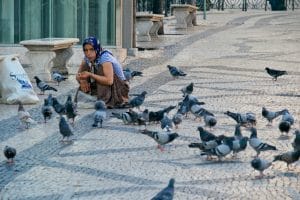On 11 September 1985, the biggest train disaster in Portuguese history took place. Near Alcafache, an international express train collided with a local barge. Nothing was ever recovered from dozens of passengers. They were totally charred in the scorching blaze.
Portuguese writer João Ricardo Pedro reconstructs in his stunning novel On the road how one of those missing ended up in that place where she did not belong. His story is also an attempt to give voice to his own guilt. As a 12-year-old, he broke off contact with his boy next door whose sister had died in the disaster. He did not know how to cope with his loss.

Nothing more than ashes
Blue sky over Alcafache. Flowers by the monument's bronze statue lie withering in the sun. A few steps behind: a mosaic of a man comforting wife and child, with the burning debris of a train behind them. A large, slender cross.
This memorial commemorates the biggest train accident in Portuguese history. On 11 September 1985, two trains collided, a regional train from Guarda and the Sud Express, bound for Paris.
According to official figures, the accident left 49 dead and 64 missing, but according to those involved and rescue workers, 150 people probably died. The fierce fires in the wagons left nothing but ashes from many bodies.
Riddles
Marta, the protagonist of the new novel On the road by João Ricardo Pedro, is one of the passengers from whom no trace is found except her backpack. Her disappearance puzzles her parents and brother João - the story's narrator. Indeed, after their family holiday in Lagos in the Algarve, 18-year-old Marta went on holiday with her friend Sofia in the Alentejo. So why was Marta on the train to Paris? Was she actually on that train at all? The mystery is only compounded when Sofia is found in the holiday home bathing with slit wrists; she must have been dead before Marta caught that train. It also turns out that Marta had broken her arm, as well as having some kind of secret life: her drawings of prostitutes and black men reveal that she regularly visited the whore district and immigrant quarter. After Marta's disappearance, family members, especially João, continue to trace Marta's corridors in their minds. 'Marta is not a nice sister to him, but she is a heroine to João,' says João Ricardo Pedro. 'Because she dies so young, he always keeps longing for her. He mystifies her.'
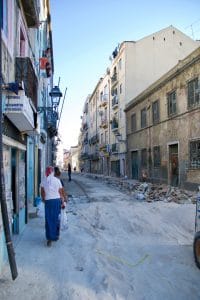
Absence
Pedro spreads out his arms. 'This here is Praça de Londres, where Marta and her family live. A neighbourhood for the middle and upper classes - lawyers, professors live here. Having grown up in a privileged family - her father is a lawyer, her mother a teacher - Marta discovers a different world, with very different people, in darker places in the city, like Largo do Intendente. That world is much more interesting to her than the one she already knows.'
The death of a friend
Through the busy city traffic, we walk to Largo do Intendente, a few kilometres further south of the city. On the way, Pedro talks endlessly about his novel; the settlement of a personal, inner feud. At the time of the train disaster, he was 12 years old. His neighbour's girl Vera was killed in the accident, he says. She was his friend Nuno's sister.
'From one day to the next, she was suddenly no longer there, and for a 12-year-old child that is SO strange. For me, this was the first confrontation with death. To this day, I remember that day, the accident, the images on television that made a deep impression on me. When I wrote my first book, I knew that my next novel would be about this - about the absence of someone, of a child, a sister. Whole families have to deal with such absence.'
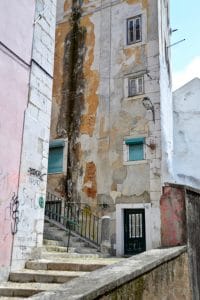
Guilt
Pedro still feels guilty about the way he handled himself at the time. 'On the day of the accident, our friendship ceased to exist. When I met Nuno on the street afterwards, I pretended not to see him. It's hard to understand why I couldn't talk to him. I was not the only one, many other boys in our neighbourhood reacted the same way. We used to play football in the street, but how were you supposed to play football with someone who had lost his sister? I think we were scared. But as a friend, I should have handled that differently. I think with this book I am trying to repay some of that guilt.'
Painful silence
In the novel, Marta's family members can barely talk to each other about the loss and grief after her disappearance. As in a shadow play, they fulfil their roles as father, mother and son, but there is no real deep contact. Pedro himself comes from a family where there was no talking about profound events or feelings. 'My father, like so many men of his generation, fought in the war in Angola in the 1960s. That made him a gloomy, melancholic man. He didn't talk about anything. For me, it was hard to deal with that. Silence can also hurt; it's hard to live with someone who doesn't understand you. I am ashamed to admit it, but as a child I was a compulsive liar. I made up stories, sometimes terrible things, and they were all lies. Sometimes I even made up that I had done something wrong, so my father got angry with me. My parents were sweet people, so I didn't do it to punish them. I think I was just trying to provoke a reaction. Better a nasty reaction than none at all.'
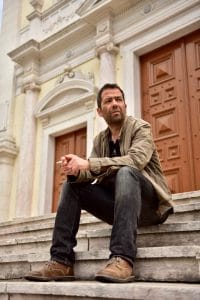
Wondrous world
Largo do Intendente is no longer as seedy a place as it was in the 1980s, we see: on the terrace of a hip café, people are enjoying lunch. In fast-changing Lisbon, old and new, poverty and increasing affluence are crowding each other, and the gap between the two is widening. Twenty years ago there were no terraces here, no hip shops, Pedro recalls, but prostitutes, drug addicts and dealers. A building full of brothels is now a fancy hotel. Modern times. Pedro laughs. 'Many Portuguese had their first sexual experiences here. Parents brought their son here to have a man made of him.
I used to find this mysterious and exciting, all these strange people formed a magical world. Marta feels the same, which is why she comes here to draw all these figures.'
Marta draws prostitutes and other people off the streets, and black people congregating in Mouraria. The neighbourhood around the castle, where colourful houses and the fountains on Praça Martim Moniz give the city a cheerful face, was long the place where immigrants congregated. Pedro points to the monument on Largo de São Domingos, a square where a massacre of Jews took place in 1506. 'Four thousand people were killed. Those who survived fled north to the Netherlands. The memorial recalls that event. And this very spot subsequently became a meeting place for people from all cultures.'
Reality
Pedro's prose is a special blend of minute descriptions and precise enumerations, interspersed with generous digressions. When he writes about actually existing places like this, he does not need to go there - preferably not even. 'I rely on my memory so that I am not contaminated by reality.' In this, he is perhaps a bit like his Marta's brother João: 'As a narrator, he is not reliable, because he is in a mental hospital. Her absence leaves a hole, and he tries to fill it. With fiction, with characters, with stories. But what of this is true and what is not?' The book does not give all the answers. Even the 'real' João does not know exactly how things are. 'It is much more interesting to leave questions unanswered.'
How Nuno has fared is a question he does wish he knew the answer to. Somehow he hopes his old friend will get hold of the novel and understand that it is about him. 'Sometimes when the phone rings, I think - I hope - that it is Nuno who is calling.'
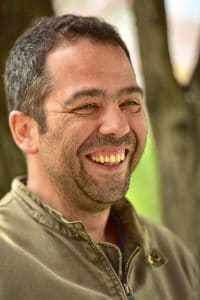
Portuguese João Ricardo Pedro (1973) was working as a technical engineer in telecoms when he lost his job due to the economic crisis in 2009 and decided to start writing. Two years later, he sent his first, as yet unpublished novel Your face will be the last in for the LeYa Prize and won 100,000 euros, plus publication of the book. The novel was widely translated. In the Netherlands, the book was published in 2013. On the road is Pedro's second novel and was published by Signatuur.
